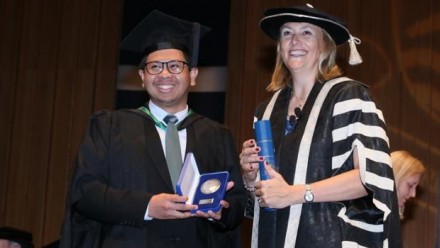University Medal accolade for Master of Energy Change student
A Master of Energy Change student has received a prestigious ANU award in recognition of exceptional academic excellence. Hilman Fathoni is the first Master of Energy Change student to be honored with an ANU University Medal.
“Winning the University Medal feels like a dream to me,” says Hilman. “It never entered my mind that I would be qualified or even become the first Master of Energy Change student to receive such an award.
Hilman’s award winning research explored off-grid renewables development in rural and remote areas of Indonesia. An international student from Indonesia, Hilman’s research is motivated by his belief in the importance of socio-cultural drivers and his interest in energy justice.
“Energy poverty is such a significant global issue,” says Hilman. “The challenges of energy access in many developing countries are immense and require innovative, low carbon solutions especially in the wake of climate change. This also often raises the critical question of justice that has long plagued the energy and climate sector.
“What my research has taught me is how non-linear and highly nuanced the nature of our pathway forward will need to be in order to achieve universal energy for all and a just transition in the future.”
There are two major findings from Hilman’s research. The first is the political implications of distributing renewables as an alternative means of energy especially in challenging the incumbent system and dominance of centralised, fossil fuels in rural electrification.
The second, equally interesting finding, drawn from on-the-ground observations in several remote sites in Sumba, Indonesia shows how energy injustice within rural communities is shaped and influenced by a variety of factors such as geography, socio-cultural hierarchy, local power structures and historical legacy.
With an undergraduate degree in geological engineering Hilman worked in the private sector and for an NGO focusing on energy in Indonesia prior to studying at ANU. He was drawn to study the ANU Master of Energy Change degree due to the unique multidisciplinary focus on energy. “I was attracted to the degree’s holistic curriculum, something which I found quite rare among other graduate programs focusing on energy,” says Hilman who received an Australia Awards scholarship.
“The reason I chose the ANU was also due to the University’s strength, particularly in the field of social science such as public policy, development studies and anthropology.” He is particularly grateful to the ANU Zero-Carbon Energy for the Asia-Pacific Grand Challenge project in supporting field work for his research project.
Hilman is now considering furthering his education with a PhD in community energy access, rural development and/or energy poverty.
Moving to Australia to embark upon further study is not just about the research. “I am going to miss a lot of things about Australia when I return home,” says Hilman. “For example, I think I have found a new love for barbecuing and it is pretty easy to do that in many public parks in Australia. As I go back to my country, I will treasure those quiet free-of-traffic-jam moments especially here in Canberra!”











